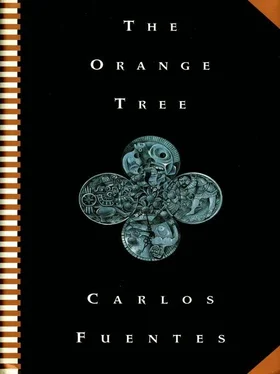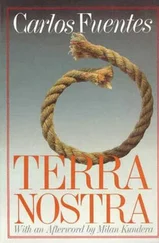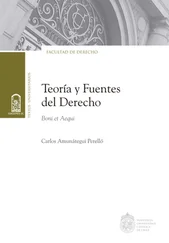In any case, he brought me with him without suspecting that I was the real traitor. Because if I went with Cortés and Guerrero stayed behind in Yucatan, it was by mutual agreement. We wanted to ensure, I with the foreigners and Guerrero among the Indians, that the Indian world would triumph over the European world. I will tell you briefly, with the little breath left to me, why.
While I lived among the Maya, I remained celibate, as if I were waiting for a woman who would be perfectly mine, who would complement my character, passion, and tenderness. I fell in love with my new people, with their simple way of dealing with the matters of life, letting the daily necessities of life take care of themselves naturally but without diminishing the importance of serious things. Above all, they took care of their land, their air, their precious, scarce water hidden in deep wells: this plain of Yucatan has no visible rivers but is crisscrossed by underground streams.
Taking care of the land was their fundamental mission; they were the servants of the land — that’s why they’d been born. Their magic stories, their ceremonies, their prayers, I realized, had no other purpose than to keep the land alive and fertile, to honor the ancestors who had in their turn kept it alive, inherited it, and had passed it quickly on, abundant or scanty, but alive, to their descendants.
Endless obligation, long succession, which at first could have seemed to us an eternally repetitive labor of ants, until we realized that doing what they did was its own reward. It was the Indians’ daily offering: in serving nature, they created themselves. It’s true: they lived in order to survive; but they also lived so the world would go on feeding their descendants when they died. Death for them was the price for the life of their descendants.
Birth and death therefore were equal celebrations for these natives, events equally worthy of joy and honor. I shall always remember the first funeral ceremony we attended, because in it we discerned a celebration of origins and the continuity of all things, identical to what we celebrate when born. Death, proclaimed the faces, gestures, musical rhythms, is the source of life, death is the first birth. We come from death. We cannot be born unless someone dies for our sake, for us.
They owned nothing, but held everything in common. But there were wars, rivalries incomprehensible for us, as if our innocence deserved only the bounty of peace and not the cruelty of war. Guerrero, spurred on by his wife, decided to take part in the wars among the nations, admitting he did not understand them. But once he’d shown his ability as a shipwright in repelling Hernández de Córdoba’s expedition, his desire and mine — the art of making boats and the art of ordering words — joined forces and silently swore an oath, with a shared intelligence and a definite goal …
[1]
Little by little — it took us eight years to discover it — Gonzalo Guerrero and I, Jerónimo de Aguilar, gathered enough information to divine (we’d never know it for certain) the destiny of the Mayan peoples, the proximity of fallen grandeur and surviving misery. Why did greatness collapse, why did misery survive?
During those eight years, we saw the fragility of the land and wondered, both of us after all sons of Castilian or Andalusian farmers, how the life of the great abandoned cities could be sustained by such meager soil and such impenetrable forests. We had the answers of our own ancestors: Exploit the riches of the forest lightly, exploit the riches of the plains well, and take care of both. This had been the behavior of the peasants since time immemorial. When it coincided with the behavior of the dynasties, Yucatan lived. When the dynasties put the greatness of power above the greatness of life, the thin soil and the thick forest could not produce enough to meet the demands of kings, priests, warriors, and bureaucrats. Then came wars, the abandonment of the land, the flight to the cities at first and then from the cities later. The land could no longer sustain power. Power fell. The land remained. Those who remained had no power other than the land.
Words remained.
In their public ceremonies, but also in their private prayers, they incessantly repeated the following story:
The world was created by two gods, one named Heart of Heaven and the other named Heart of Earth. When they met, between them they made all things fertile by naming them. They named the earth, and the earth was made. Creation, as it was named, dissolved and multiplied, calling itself by turns fog, cloud, or whirlwind of dust. Named, the mountains shot from the depths of the sea, magic valleys formed, and in them grew pines and cypresses.
The gods filled with joy when they divided the waters and caused the animals to be born. But none of this possessed the same thing which had created it: language. Mist, ocelot, pine, and water: silent. Then the gods decided to create the only beings capable of speaking and of naming all things created by the word of the gods.
And so people were born, with the purpose of sustaining divine creation day by day by means of the same thing that brought forth the earth, the sky, and all things in them: language. When we understood these things, Guerrero and I understood that the real greatness of these people was not in their magnificent temples or their deeds in war but in the most humble vocation of repeating in every minute, in every activity in life, the greatest and most heroic thing of all, which was the creation of the world by the gods.
From then on, we strove to strengthen that mission and to restore to our native Spanish earth the time, beauty, candor, and humanity we found among these Indians … Language was the double power shared by gods and men. We found out that the fall of the empires liberated language and men from a falsified servitude. Poor, clean, owners of their words, the Maya could renew their lives and those of the entire world beyond the sea …
In the place called Bay of the Bad Fight, the very place where Gonzalo Guerrero’s knowledge allowed the Indians to defeat the Spaniards, forests were leveled, planks sawed, hardware manufactured, and the frameworks raised for our Indian fleet …
From my Mexican tomb, I encouraged my comrade, the other surviving Spaniard, to answer conquest with conquest. I failed in my attempt to make Cortés fail; you, Gonzalo, must not fail. Do what you swore to me you would do. Look: I’m watching you from my bed in the ancient lake of Tenochtitlán, I the fifty-eight times named Jerónimo de Aguilar, the man who was the transitory master of words who lost them in an unequal fight with a woman …
[0]
All this I saw. The fall of the great Andalusian city in the moan of the conch shells, the clash of steel against flint, and the fire of Mayan flamethrowers. I saw the burnt water of the Guadalquivir and the burning of the Tower of Gold.
The temples fell, from Cádiz to Seville; the standards, the towers, the trophies. And the day after the defeat, using the stones of the Giralda, we began to build the temple of the four religions, inscribed with the word of Christ, Mohammed, Abraham, and Quetzalcoatl, where all the powers of imagination and language would have their place, without exception, lasting perhaps as long as the names of the thousand gods of a world suddenly animated by the encounter of everything forgotten, prohibited, mutilated …
We committed a few crimes, it’s true. We gave the members of the Holy Inquisition a taste of their own medicine, burning them in the public plazas, from Logroño to Barcelona and from Oviedo to Córdoba … We also burned their archives, along with the laws about purity of blood and being “old Christians,” and if some convents (and their tenants) were violated, the ultimate result was an increased mixing of bloods — Indian and Spanish but also Arab and Jew — that in a few years crossed the Pyrenees and spread over all of Europe … The complexion of the old continent quickly became darker, as that of southern, Arabian Spain already was.
Читать дальше












